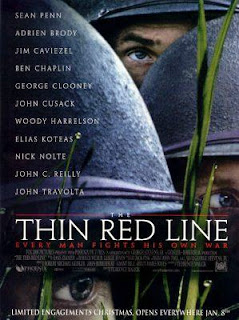Tuesday, 31 May 2016
The Thin Red Line (1998)
Terrence Malick's third film is the kind of brilliance you'd expect from him and more. I never thought philosophy could be so visceral outside of drug trips. Malick's philosophy is vital and far from ponderous, pretentious or tacked on, which is what makes his films so powerful. He marries the subjective inner lives of his characters with the cosmic and objective, the average with the mystifying, the chaotic and confused with the harmonious and synchronous. It's that contradiction that makes his work so hypnotic and mind blowing, why Kit Carruthers kicking a tin can around a dusty alleyway is so special.
The film begins with a shot of a crocodile (or alligator, whatever, I think it's a croc), submerging into a pool. The birth of man's predatory nature? Two men have gone AWOL and are living a carefree life with a group of natives by the sea, heaven on Earth. Suddenly by chance a navy patrol boat appears off the coast and they're taken prisoner before Private Witt is reassigned to a company who then land on an island with the intent of securing an airfield. Nick Nolte plays the one in charge who like everyone else is going to war for the first time. In a quiet inner monologue that betrays his hard-boiled exterior it's revealed he's filled with doubt over his motivations and his role in the conflict, which is understandable given he's as green as the troops he commands. The whispered monologues are a master stroke, In a masterful scene the troops land on the island to find it deserted. There is no music and the scene has an eerie, alien quality to it. Not long in and the fighting begins out of nowhere, into a confusing but beautiful and horrific trip of fear, panic and decision beyond reason and time, of men falling into questioning and reasoning within and then forced to act as if by unseen hands. The lack of reason or motivation with the clarity of the imagery and the free floating camera makes everything seem as if it's happening out of time, out of nowhere, manifestations of the void.
The film had a really strange effect on me that no film has ever given me before, and that is a kind of revelation. As the camera seemed to fall down the hill and the men pushed up it I had this sudden sensation that I've rarely experienced sober and never experienced from a film, of time completely dying and the chaotic order of things attached to the very tips of my fingers, of existence itself emerging from me and yet meeting me at the very edge of my being. The thin red line indeed. Suddenly I had the strange sensation of floating in a fairground spinning cup in utter blackness and nothingness forever. I felt the cause of everything that was happening on the screen, of the conflict inside and out, and yet at the same time tied up in it. I could feel everyone standing in one another's light. I experienced ego death watching a film. I can think about that on an intellectual level watching a film, and I can think have a cleansing experience watching a film, but a film has never induced full blown ego death in me before. It was only brief (yet eternal), but I'm still pretty mystified. The soldiers themselves to come to terms with ego death in a way, as they're stripped of their identities as people and made into fighters and killers for a cause they thought they knew that eludes them in combat.
This film can only be described as "godlike" for the way it portrays both the physical horror and the existential horror of war; the doubting, the questioning, the disillusionment. I don't think it's an anti-war film because I think it portrays war as just another part of the grand scheme of everything, and any judgement would ruin the experience. The characters are great, from cool Private Witt who rides on faith to Nick Nolte's internally desperate and weak commander, to Sean Penn who is more cynical and hardboiled. There is a whole host of characters played by stars in small roles, and yet they're all believable. The film shows each of these characters' inner questioning and ideals which makes the sudden deaths particularly unnerving, and yet in the film's spiritual, metaphysical form one gets the sense that each voice in the monologue is one voice, and the death of one speaks through another.
Anyone, if there is anyone out there reading this, WATCH - THIS - FILM.
Subscribe to:
Post Comments (Atom)

No comments:
Post a Comment